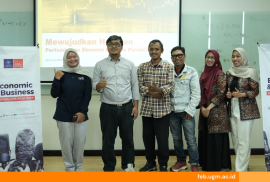Friday (18/10), PT. Freeport Indonesia (PTFI) cooperates with the Faculty of Economics and Business Universitas Gadjah Mada (FEB UGM) held a Mining Talk titled Natural Resource Management as an effort to build closeness with the public through education about the benefits of mining activities in a comprehensive manner. Indonesia is a country with very high mineral reserves. In nickel minerals, Indonesia ranks third in the global level. In addition, Indonesia recorded a contribution of 39% for gold products, ranked second after China. This makes Indonesia always in the top 10 in the world. With its enormous potential, the mining sector contributes in to non-tax state revenue (PNBP). In its application, mining companies refer to the principles of sustainability in the use of natural resources for the greatest prosperity of the people and the achievement of Sustainable Development Goals (SDGs).
This discussion was motivated by the need for a good understanding from stakeholders in the management of the mining industry. Moreover, PTFI is conducting a new assessment in completing the divestment process of shares and is now moving from a Contract of Work to a Special Mining Business License (IUPK). Through this IUPK, the Indonesian government has provided long-term business certainty with the extension of the operating period of 2 x 10 years until 2041 and the existence of fiscal and regulatory guarantees.
Eko Suwardi, M.Sc., Ph.D. as the Dean of FEB UGM delivered a speech signaling the start of the event. “I think we remember in the 4th paragraph our country’s goal is to advance public welfare, that we must take advantage of the earth’s water and its contents for the benefit of the people, one of them is mining.”, Eko said.
Eko Suwardi also emphasized young people to want to care about the development of the mining sector. “Therefore, it is our duty as the young generation to know about mining in our country, this is very important for us as the next generation to know about mining from people who undergo and manage natural resources in Papua”, he added.
The next session was the presentation of material on mining sector in Indonesia by Tony Wenas, President Director of PT Freeport Indonesia. Tony Wenas as the keynote speech at this event began the discussion by giving a description of the mining sector. “Speaking of mining, starting from our activities after waking up almost all of us involve goods that are 90% derived from mining materials. Mining takes us to the era of civilization”, he added.
According to him, Indonesia is a rich country in terms of mining, oil and gas, plantations and forestry. However, he believes that there is still a lot of Indonesia’s natural wealth that yet has not been explored. “For example, our total gold production can still last up to another 30 years, our copper will be 100 years, tin 11 years, nickel 58 years, and coal 49 years. Therefore, if that time period runs out, it must be done continued exploration because mining goods are non-renewable”, Tony said.
He added that behind the high mining risk, and the relatively long return on capital, Indonesia’s mineral potential is at the best position in the mineral potential index. “Our tin is biggest, copper are in number two, nickel number three, and therefore become we as the one of the biggest mining producers in the world”, he said.
In addition, he added that mining also generates large revenues on the export side, because most mining goods is well in selling at the export market, and also good in the formation of GDP, because mining contributes 4.70% to Indonesia’s current GDP.
When discussing the price of mining goods, he said that the price factor was beyond the control of the producer. “Mining goods are price takers, we accept existing market prices, market prices will be greatly influenced by supply and demand”, he said.
He also explained the correlation between supply and demand in the mining market. “Too much supply will reduce prices, and some companies will stop production, to the point where prices will rise again. When viewed from demand, demand is still high, but there are some factors beyond that make prices depressed, such as international politics”, closed him.
After the session of material presentation by Tony Wenas, the event ended with the giving of souvenirs and a photo session between the deans and lecturers of FEB UGM and the board of directors of PT Freeport Indonesia.
Source: Sony Budiarso / Leila Chanifah Zuhri




